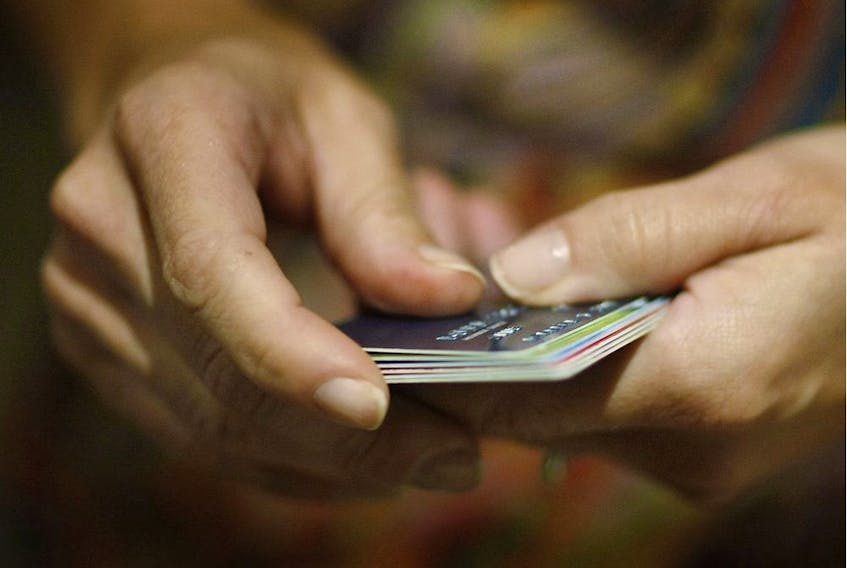Q: My girlfriend and I have been living together for about three years, ever since we graduated university together. We weren’t sure how official we wanted our relationship to be so we kept our finances separate. But it’s time to change that because we’re planning to get married. The thing is, as we talk about money, I wonder: How much debt is too much for a couple to have? We both still have student loans to finish paying off, she has a car loan, I’ve got some credit card debt, and we bought some furniture with a store credit card we applied for together. We are managing with the payments but a wedding has a price tag, even if we keep it small. How do we know if we can take on more debt or not? ~Anthony
A: Debt has unfortunately become such a normal part of our lives that many of us hardly realize that taking on a new financial commitment, or increasing the amount of debt we already have, can put our budgeting into a serious danger zone. However, to put an exact dollar value on how much debt is too much isn’t possible. It depends on your circumstances — your income and employment situation, the debt and obligations you already have, your future goals and plans, even your health and family situation.
Some Canadian after-tax income budgeting guidelines are available, if you’re curious how much you “should” be spending on various expenses. Keep in mind though that every person and each household are different. A general rule of thumb is to not max yourself out financially because you never know when an emergency will hit. From an economic downturn, to an employment or health-related crisis, even a change in your personal situation — if you have a financial safety net, rather than making ends meet living paycheque to paycheque, you’ll be better able to weather the storm.
What might a lender say about too much debt?
A lender must follow specific criteria when you apply for a loan, mortgage or other credit. Here is a good article that explains how the ratios work that a lender must use when determining how much you’re able to borrow. The important thing to remember is that a financial institution bases its lending criteria on your gross income — what you get before taxes is taken off. While this serves to maximize how much you can borrow, it can make budgeting difficult.
We manage our money and payments with our net income — the amount of money that is actually deposited into our bank account. This can be as much as 20 or even 25 per cent less than our gross income. It is important to consider all of your circumstances before taking on additional debt so that you aren’t forced to commit to a more frugal lifestyle than you had planned.
Don’t ignore these warning signs
One of the easiest ways to tell if you might have too much debt already is by looking at the warning signs that come with being in debt. Ask yourself honestly if any of the red flags apply to you. If they do, then before you take on more debt or your situation takes a turn for the worse, consider how best to turn things around and increase your financial stability.
Never paying credit cards off in full
Carrying a balance on your credit card indefinitely by only making minimum payments means you’re pretty much on the never-never plan. Minimum required payments do not pay off a credit card quickly. In fact, the interest you end up paying means you have a lot less money to put towards other debts and goals.
Allowing bills to stack up
With electronic statements now the norm, for many, the proverbial pile of bills is no more. However, emails to check your e-statements and app reminders for payment due dates are one and the same. If you’re ignoring your inbox because you’re afraid to see how much you owe, Houston, we have a problem.
Using a credit card to pay for essentials
If you use a credit card to pay for essential items like gas and groceries, is it because your bank account is looking a bit poor? If your bank account is fine and you’re simply collecting points, be cautious that you’re not justifying purchases just to get points. After all, your credit card must stay in good standing for you to maintain access to your points or rewards.
Taking cash advances from your credit card
If you’ve tapped out your overdraft but the rent is due, how do you come up with the money? If you take a cash advance from your credit card to cover it off, you could be digging yourself deep into debt quickly because cash advances are an extremely expensive form of credit.
Making payments late
If you have trouble paying bills on time, this might be because your budget has very little wiggle room. If you have enough money, organize it better to pay bills on time so that your credit rating doesn’t suffer.
Borrowing money from family or friends
Have friends and family stopped taking your calls? Even if you’re not at that point quite yet, relying on those closest to you to get you out of a jam can ruin relationships no amount of money can buy.
Relying on expensive forms of credit
If you’re relying on payday loans and other expensive forms of credit to make ends meet, you’re living in a financial danger zone. Spending more than you earn can only last so long before you end up with way more debt than you can handle on your own.
Credit Myths Debunked and What to Do Instead
Using one form of credit to pay another
Some call this robbing Peter to pay Paul, but if you often use one form of credit to pay another, e.g. overdraft or line of credit to make a car loan payment, your situation could be teetering dangerously close to the edge.
Consolidating your debts repeatedly
Applying to consolidate your debts several times over means that your money management problem might be more serious than you think. The idea behind consolidating is to pay off what you owe by budgeting, not using the accounts you paid off, and certainly not applying for credit you can’t afford. If you, however, are a serial consolidator, your budgeting and money management might be to blame. Without financial skills you will have trouble keeping yourself out of debt.
Top 5 Solutions When Declined for a Consolidation Loan
Avoiding financial matters altogether
If you’re avoiding dealing with your finances, hiding spending from your partner, and not answering the phone unless you recognize the caller, these are all signs that you might be in over your head. You might also be spending impulsively because you’re worried about money, and you could be losing sleep worrying about your debts. Feeling hopeless about your finances is no way to live and is a big indication that you need help sooner than later.
How to Talk to Your Spouse About Financial Goals
Where to get help if you need it
If any of these warning signs sound like you, get help sooner than later. Visit your financial institution, talk to a trusted family member or friend or contact a non-profit credit counselling agency in your area. The sooner you take control of your situation, the more options you’ll likely have available to you.
See How Your Budget Would Look – Interactive Budget Spreadsheet
The bottom line on figuring out how much debt is too much
If you’re wondering if you have taken on too much debt already, you probably have. Before agreeing to more, take the time to review your budget carefully and see which expenses you would need to cut in order to make ends meet. Then put the new, tighter budget to the test by living as if you had already taken on the additional payments you’re considering. Set the money aside in a savings account for a few months and see how it feels. The good thing about a test drive is that the money isn’t actually gone; abandon the test if it’s not working, rejig the numbers, or use the money you saved as a cushion if you do go ahead with a new loan. There’s no good way to make a bad decision; a test-drive with help you figure out the best way to go.
Related reading:
3 Bad Money Mistakes People in Debt Make
Is There Such a Thing as Good Debt?
Alternatives to Costly Loans for People with Bad Credit
Scott Hannah is president of the Credit Counselling Society, a non-profit organization. For more information about managing your money or debt, contact Scott by email , check www.nomoredebts.org or call 1-888-527-8999.
Copyright Postmedia Network Inc., 2019









